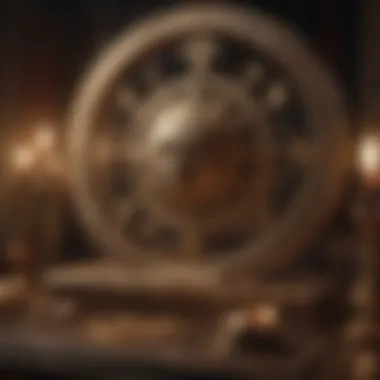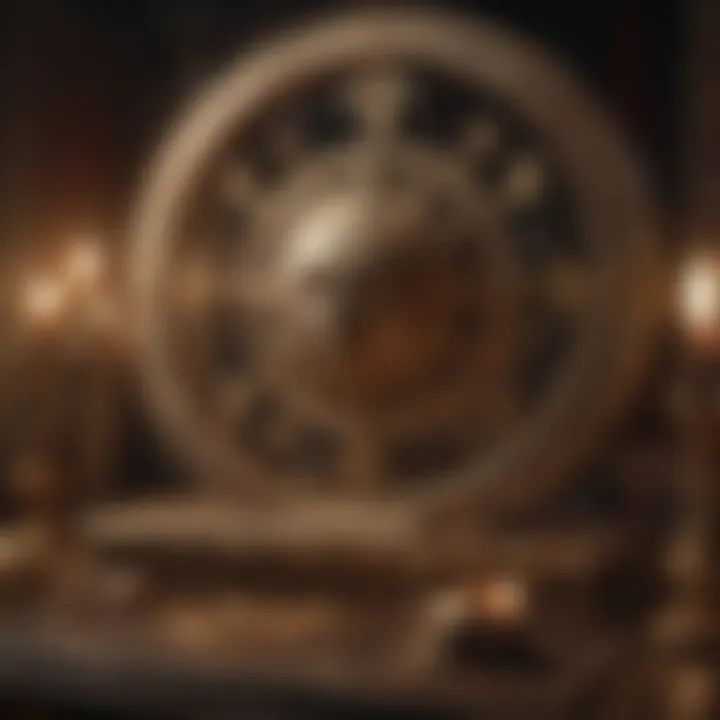The Rise of AI Fortune Tellers in Modern Astrology


Intro
Artificial Intelligence is changing various aspects of our lives, and astrology is no exception. As society becomes more digital, the appeal of AI fortune tellers grows. These AI systems provide users with astrological insights based on their specific inputs. The blend of technology and traditional practices raises intriguing questions. How do these AI-driven forecasts compare to those provided by human astrologers? What implications emerge for the spiritual community, especially regarding trust and authenticity? Understanding these dynamics is essential for both practitioners and enthusiasts.
Astrological Concepts
Astrology has a rich history and a complex framework. The integration of AI fortune tellers can reshape how individuals interpret celestial influences. To grasp their impact, we must first define essential terms and explore astrology's historical significance.
Definition of Key Terms
- Astrology: The study of celestial bodies' movements and positions and their potential influence on human affairs.
- Horoscope: A chart representing the positions of the sun, moon, and planets at a specific time, used to interpret an individual's future.
- AI Fortune Teller: A digital tool that utilizes algorithms to offer astrological insights based on input data from users.
Historical Background of Astrology
Astrology dates back thousands of years. It has roots in ancient civilizations like Babylon and Egypt. Those early societies observed celestial patterns and correlated them with earthly events. Greeks further developed astrology, integrating philosophy and celestial studies.
In modern times, astrology exists in various forms. Its evolution shows how human understanding of the cosmos has deepened, leading to diverse interpretations and practices today.
Overview of Different Astrology Branches
Astrology comprises several branches, each with unique approaches. Some of these include:
- Natal Astrology: Focuses on an individual's birth chart and personality traits.
- Horary Astrology: Answers specific questions based on the time a question is asked.
- Electional Astrology: Determines the best timing for significant events, like weddings or business launches.
Understanding these branches is crucial in analyzing how AI fortune tellers fit into modern astrological practices.
Zodiac Signs Exploration
The zodiac is central to astrology. Each sign has its own attributes, strengths, and weaknesses. AI fortune tellers often incorporate zodiac sign analysis into their readings.
In-Depth Analysis of Each Sign
The zodiac consists of twelve signs, each linked with specific characteristics. For example:
- Aries: Independent and energetic, often takes initiative.
- Taurus: Known for patience and reliability, values stability.
- Gemini: Adaptable and curious, loves communication.
Understanding these traits allows AI systems to better analyze user submissions and generate more tailored insights.
Personality Traits and Characteristics
Each zodiac sign brings unique traits. These can be affected by other factors such as the moon and rising signs. AI can analyze these variations when creating personalized forecasts. However, such nuances can sometimes escape an algorithm's grasp.
Historical and Mythological Connections
Astrological signs often relate to myths or symbols. For instance, the sign Leo is connected to the lion in mythology, symbolizing bravery.
Learning these connections enriches the AI's interpretive framework while maintaining traditional significance.
Celestial Events
Celestial events have long influenced astrological interpretations. AI fortune tellers incorporate these events into their algorithms to enhance readings.
Major Cosmic Phenomena
Events like eclipses, retrogrades, and planetary alignments significantly impact astrological analysis. Each occurrence carries particular meanings for different zodiac signs.
Impact of Celestial Events on Astrology


AI systems utilize historical data regarding celestial events to generate forecasts. They examine how past events correlated with significant life events for individuals and society alike.
Rituals and Practices During Celestial Events
Astrologers often observe specific rituals when major celestial events occur. These practices aim to harness or balance energies. Integrating such rituals with AI could create a more holistic approach, addressing both spiritual and analytical dimensions.
“AI fortune tellers represent a fusion of technology and tradition, offering a new path for astrological exploration.”
Prelude to AI Fortune Tellers
AI fortune tellers represent a significant shift in how individuals engage with astrology. Their emergence has sparked debates about the nature of divination and the role technology plays in spiritual practices. As we delve into this topic, we will examine specific aspects related to AI fortune tellers, focusing on their definitions and the rapid rise of digital astrology. Understanding these elements is essential for grasping the broader implications of artificial intelligence on traditional astrological practices.
Defining AI Fortune Tellers
AI fortune tellers are digital systems that utilize algorithms and data analytics to provide insights similar to traditional fortune-telling methods. They rely on large datasets, patterns, and user inputs to generate personalized astrological readings. Essentially, they mimic the consultative nature of human astrologers while employing an automated process. Some popular AI fortune teller applications and platforms include Co-Star and The Pattern. These tools have successfully integrated user-friendly interfaces, making astrology more accessible for a tech-savvy audience.
"AI fortune tellers challenge our understanding of how predictions can be made, raising questions about accuracy and authenticity."
The Rise of Digital Astrology
Digital astrology has grown rapidly in the last decade, fueled by advancements in technology and changing perceptions of occult practices. More people now reach for their smartphones to connect with astrology, leading to the development of numerous apps and online platforms. These digital solutions meet the desire for instant gratification and personalized insights that many users crave.
- Accessibility: Unlike traditional astrologers who may require appointments, online services are available 24/7.
- Affordability: Many AI-based services offer free or low-cost readings, democratizing access to astrological insights.
- Customization: Users can tailor their experience based on their preferences, receiving readings that align with their personal interests.
The convergence of astrology and technology signifies a transformation of ancient practices into a format that resonates with contemporary values. The popularity of AI fortune tellers illustrates a shift, prompting us to explore their impact further in this dynamic landscape.
Mechanics of AI Fortune Telling
The mechanics of AI fortune telling involve a blend of advanced algorithms and insightful data analysis to predict outcomes and offer guidance that resonates with users. Understanding these mechanics is crucial as they represent the backbone of the interaction between technology and astrology. Users need to comprehend how their information is processed and the implications of such processes on their astrological readings. With rising interest in AI fortune tellers, both the potential benefits and the considerations that come into play are worth exploring. This section discusses two key areas: algorithmic insights and user experience.
Algorithmic Insights and Data Analysis
Algorithmic insights form the core of AI fortune telling. These algorithms analyze vast datasets that incorporate both standardized astrological principles and individualized user data. For instance, AI platforms may use historical astrological data combined with user-specific inputs such as birth date, time, and location. By processing this information, the algorithm can identify trends, make predictions, and customize readings accordingly.
The AI models often incorporate machine learning, allowing them to improve over time by refining their predictions based on user feedback and outcomes. This adaptability adds a layer of personalization that traditional astrology may lack. However, one must approach these predictions with a critical eye. The accuracy of insights depends on the quality of the underlying data and the algorithm's complexity.
User Interface and Experience
User interface plays a pivotal role in how individuals interact with AI fortune tellers. A well-designed interface makes the experience more intuitive and engaging, which can encourage users to explore the tools more deeply. For example, AI fortune-telling applications often provide visualizations that represent astrological data, making it easier for users to understand complex information.
Additionally, user experience encompasses how the platform meets user expectations and addresses their needs. Feedback mechanisms are vital. Users should have the ability to express satisfaction with the insights provided. The level of responsiveness and quality of predictions greatly influences user trust.
A seamless interface encourages ongoing engagement and fosters a sense of connection to the astrological wisdom the AI claims to offer. Proper navigation, clarity of information, and user support all contribute to a satisfactory experience.
To sum up, the mechanics of AI fortune tellers involve essential components like algorithmic insights and thoughtful user experiences. These influences shape how modern users perceive and engage with astrology in a digital context.
Comparing Traditional Astrology and AI Fortune Telling
The discussion between traditional astrology and AI fortune telling is vital in understanding the modern landscape of astrology. Traditional practices are deeply rooted in centuries of tradition, intuition, and personal insights, while AI fortune telling represents a new era, propelled by technological advancements and data-driven insights. This comparison sheds light on both the strengths and limitations of each approach, allowing practitioners and clients alike to make informed choices regarding their astrological experiences.
Astrological Foundations vs.
AI Algorithms
Traditional astrology relies heavily on ancient astrological foundations. These include the study of planetary movements, houses, and the twelve zodiac signs, which have been practised for centuries. Astrologers interpret these elements through a personal lens often infused with intuition and experience. The foundational knowledge draws from texts, historical context, and an understanding of human psychology in relation to celestial events.
On the other hand, AI algorithms utilize vast databases of astrological data, often aggregating information from many sources. Machine learning models analyze this data to provide users with insights that may mirror traditional interpretations. However, the essence of the interpretation lies within statistical patterns rather than human understanding. This can lead to insights that are less nuanced.
- Strengths of Traditional Astrology
- Strengths of AI Algorithms


- Deep historical context
- Intuitive insights tailored to the individual's unique circumstances
- Rapid data processing and analysis
- Access to a large volume of data for creating insights
Understanding the strengths of each method allows users to navigate their astrological needs more effectively. Traditional astrology provides personal touch, while AI offers efficiency and broader analysis.
Intuition vs.
Computation
The heart of traditional astrology lies in human intuition. Astrologers rely on years of experience and personal insight to interpret planetary alignments, providing readings that often resonate on a deeper emotional and spiritual level. The interpretative process is not just about the data; it involves connecting with the client’s energy and needs.
Conversely, AI fortune tellers operate on computation. They analyze patterns, correlations, and statistical data at extraordinary speeds. The readings provided by AI might not always resonate as deeply as those from a live astrologer. While they can deliver information quickly, they may lack the intuitive depth that comes from years of astrological expertise.
In summary, while traditional astrology emphasizes human intuition and deep personalization, AI fortune telling offers speed and scalability through data-driven analysis.
- Intuition:
- Computation:
- Supports a personalized experience
- Builds trust and emotional connection
- Provides swift analysis
- Offers insights based on data patterns
Both approaches present valuable perspectives for today's individuals seeking astrological guidance. Their effectiveness may vary based on personal preferences and needs.
User Perspectives on AI Fortune Tellers
User perspectives on AI fortune tellers are crucial for understanding how this new wave of technology is perceived and utilized by the public. In a landscape where ancient traditions intersect with modern technology, the viewpoint of users sheds light on how AI fortune-telling aligns with, or diverges from, conventional astrology practices. As individuals increasingly look to digital mediums for guidance, examining their experiences can reveal significant insights into both the operational effectiveness of AI fortune tellers and the socio-cultural implications of their rise.
There are many aspects to consider when exploring these perspectives, including:
- The demographics of users who engage with AI fortune tellers
- The patterns of engagement—how often and in what ways individuals seek out these services
- Levels of satisfaction and trust in the predictions provided
This analysis contributes to a broader understanding of AI's influence in the realm of astrology while addressing potential benefits and concerns.
Demographics and Engagement Patterns
Understanding the demographics of individuals who use AI fortune tellers is essential. Studies indicate that the user base is diverse, spanning different age groups, genders, and socio-economic backgrounds. However, a noticeable trend reveals that younger generations, particularly millennials and Generation Z, are more prone to engage with AI-driven platforms. This demographic is generally more tech-savvy and comfortable with digital interfaces, making the attractiveness of AI fortune tellers significantly higher for them.
Platforms such as AstroSeek and Co-Star thrive on this engagement, providing tailored astrological insights via algorithms that appeal to these younger audiences. Engagement patterns also highlight the frequency of use. Casual users tend to visit these applications or websites occasionally, while more invested individuals may seek daily or weekly guidance.
- Casual Users: Occasional consultations, often during transitions or moments of uncertainty.
- Frequent Users: Regular engagements for ongoing personal development or decision-making support.
This differing engagement reveals much about how and why individuals turn to AI fortune tellers, showing a blend of curiosity, necessity, and reliance on technology for answers.
Satisfaction and Trust in AI Predictions
Satisfaction with AI fortune tellers varies considerably among users. While some report positive experiences and useful insights, others express skepticism about the accuracy of AI-generated predictions. The inherent trust in AI seems to correlate with users’ familiarity with technology. Those who view AI as a reliable tool are generally more satisfied with their experiences. On the contrary, users who prefer traditional methods often question the validity of algorithmic insights.
Limitations and Ethical Considerations
The introduction of AI fortune tellers into modern astrology prompts significant discussions regarding limitations and ethical considerations. Both users and practitioners grapple with these issues. The technology may offer new insights, but it also brings challenges that cannot be overlooked.
Understanding these limitations is crucial for anyone involved in astrology today. First, AI fortune tellers depend on vast amounts of data and patterns. Their predictions might feel precise; however, they often lack the nuanced understanding of human emotions and personal circumstances that a traditional astrologer possesses. This gap can lead to misinterpretations and unrealistic expectations among users.
Ethical considerations add another layer of complexity. As AI fortune telling grows, questions about data use and predictive accuracy become paramount. Users must be informed about how their information is collected, stored, and utilized.
Data Privacy Issues


Data privacy is one of the most pressing concerns affecting AI fortune tellers. Modern applications commonly gather personal data, often including sensitive information. Users might not realize their birth date or location is stored to create astrological readings.
The digital landscape lacks stringent regulations, placing the onus on companies to protect user data. Breaches can occur. Hackers can exploit vulnerabilities, exposing users to potential risks. Therefore, service providers must communicate their data policies clearly to build trust.
For users, it is important to investigate how an AI service handles personal information. Questions to consider include:
- What data is collected?
- How is it secured?
- Is it shared with third parties?
Ultimately, users must weigh the benefits of AI-driven insight against the risks to their privacy.
Potential for Misrepresentation
Another significant concern involves the potential for misrepresentation in AI fortune telling. Unlike traditional astrologers, who may draw on personal intuition and the context of a client’s life, AI systems generally operate on established algorithms. These algorithms can sometimes generate forecasts that lack context or that misinterpret complex astrological symbols.
Users may not distinguish between AI predictions and those of a trained astrologer. This scenario could lead to misguided reliance on AI-based readings. A user may make important life choices based on generalized insights. Such choices may not account for unique circumstances.
It is essential for consumers to approach AI fortune telling with skepticism. A healthy balance between technological insights and human interpretative skills will foster a more nuanced understanding of astrology. As individuals engage with these AI systems, they must remain aware of their limitations and the potential consequences of misrepresentation.
"Navigating the intersection of technology and tradition requires careful consideration of both the advantages and limitations."
In summary, limitations and ethical considerations in AI fortune telling are complex and multi-faceted. Users need to engage mindfully with AI content, ensuring their personal data remains secure while acknowledging that AI lacks the depth of human insight. Awareness of these elements will contribute to a more responsible and enlightened approach to astrology in the age of technology.
Cultural Impact of AI in Astrology
The integration of artificial intelligence into astrology has led to significant cultural changes. Historically, astrology has been viewed through traditional lenses, often representing a more mystical and intuitive practice. With the rise of AI fortune tellers, many modern perceptions of astrology are evolving. Digital technologies are transforming how astrology is experienced, practiced, and understood.
Changing Perceptions of Astrology
Astrology once relied heavily on the personal touch of a skilled astrologer. Each reading was bespoke, often requiring deep engagement and intuition. However, AI fortune tellers streamline this process, making astrology accessible to a broader audience. This democratization presents new challenges and opportunities for the field.
Some users appreciate the convenience of AI tools, relying on algorithms to receive quick insights. Others remain skeptical, questioning the validity of predictions generated without a human touch. The cultural landscape is shifting; astrology is becoming less about individual readers and more about consumer experiences. This change highlights a diverse array of perceptions, from believers in astrology's predictive abilities to cynics doubting its relevance.
- Increased accessibility: AI fortune tellers offer astrological insights to those who may never have seen a professional astrologer.
- Diverse audience: Younger generations often gravitate toward AI tools over traditional methods, reflecting a cultural shift.
The Future of AI Fortune Telling
The future of AI fortune telling is pivotal for the landscape of astrology as it presents various possibilities and challenges. With technology evolving rapidly, the integration of AI into astrological practices becomes more sophisticated. User expectations fluctuate because of the advances in AI capabilities. For both traditional astrologers and tech-savvy enthusiasts, the potential impact on how astrology is practiced and perceived is profound. There are several specific elements to consider moving forward.
- Increased Accuracy: Future AI fortune tellers can analyze vast amounts of data more thoroughly than a human astrologer might. This may lead to higher accuracy in predictions and insights.
- Accessibility: Digital platforms bring astrology to a broader audience. AI can help democratize access to astrological insights, making it easier for those who might not see traditional practices as approachable.
- Cultural Adaptation: Astrology has roots in various cultures. As AI technologies advance, there could be a trend towards creating customized experiences that respect these differences.
"The integration of AI in fortune-telling could revolutionize how insights are delivered, giving rise to new forms of astrological engagement."
Advancements in AI Technology
The rapid advancements in AI technology are transforming the realm of fortune telling. Recent developments in machine learning and natural language processing significantly enhance the accuracy and quality of predictions. AI models can digest enormous datasets and, through algorithms, discover patterns not immediately visible to human analysts. This allows for personalized readings that respond to individual queries in real-time.
Moreover, the potential application of deep learning algorithms can refine prediction capabilities. By using previous engagement data, these systems can continuously improve their advice mechanisms. AI models can also analyze user behavior, learning preferences, and even emotional tones based on text inputs, bringing a new dimension to interaction in astrological contexts.
Integration with Traditional Practices
Despite the growing role of AI in astrology, the possibility of integrating these technologies with traditional practices is crucial. Traditional astrologers often rely on extensive knowledge of celestial patterns and symbolic meanings. AI could serve as a complementary tool rather than a replacement. For example, AI can assist astrologers by providing data analysis, freeing them to focus on interpretation and human connection.
In addition, traditional methods can enrich AI models. Astrologers can input their insights into training datasets to shape how AI interacts with users. This may lead to the development of AI systems that reflect deeper astrological wisdom while appealing to modern audiences. The integration could ultimately create a hybrid model where technology and traditional astrology inform one another, fostering a deeper appreciation for both.
Ultimately, the future landscape of AI fortune telling holds the potential for enriched practices in astrology, merging innovation with tradition responsibly.
Closure: The Path Ahead
The exploration of AI fortune tellers in modern astrology opens many conversations regarding the future of astrological practices. This emerging field presents opportunities and challenges that are critical to understand. As technology continues to evolve, so too does its integration into personal and spiritual realms.
Lessons from AI Fortune Tellers
AI fortune tellers provide an opportunity for users to gain insights from vast datasets and sophisticated algorithms. Their influence has made astrology more accessible to a wider audience. However, it is essential to recognize the limitations of these automated systems. Here are some key lessons learned:
- Data-Driven Insights: AI offers data-based predictions that are quick and efficient. It removes some of the bias that human astrologers might bring, yet also lacks depth.
- User Engagement: The convenience of AI-driven astrology applications engages users who might not traditionally seek astrological advice. This has led to an increase in digital engagement, expanding the audience.
- Customization: Many AI fortune tellers provide personalized services, using individual data to tailor predictions, which can result in unique experiences for users.







